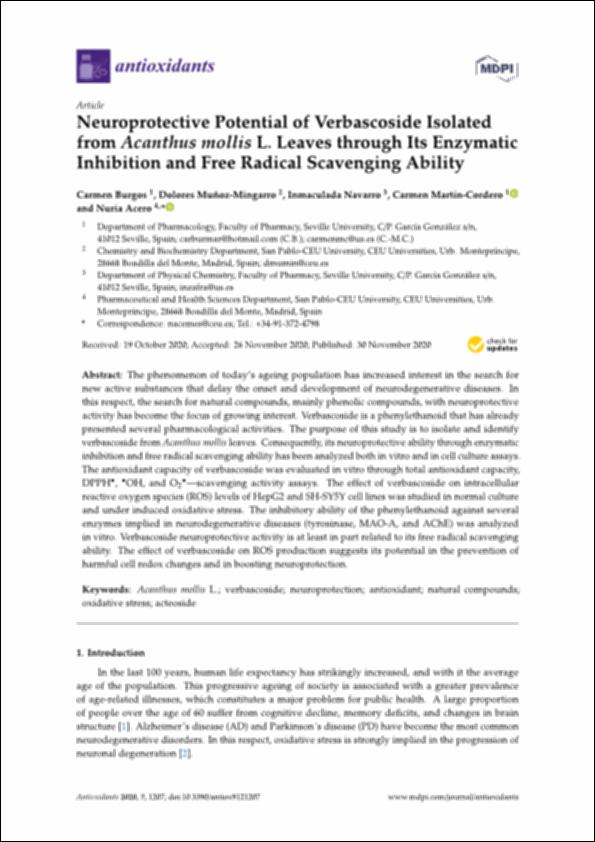Please use this identifier to cite or link to this item:
http://hdl.handle.net/10637/15705Neuroprotective Potential of Verbascoside Isolated from Acanthus mollis L. Leaves through Its Enzymatic Inhibition and Free Radical Scavenging Ability
| Title: | Neuroprotective Potential of Verbascoside Isolated from Acanthus mollis L. Leaves through Its Enzymatic Inhibition and Free Radical Scavenging Ability |
| Authors : | Burgos, Carmen Muñoz Mingarro, Dolores Navarro, Inmaculada Martín-Cordero, Carmen Acero de Mesa, Nuria |
| Keywords: | Acanthus mollis L.; Verbascoside; Neuroprotection; Antioxidant; Natural compounds; Oxidative stress; Acteoside |
| Publisher: | MDPI |
| Citation: | Burgos, C.; Muñoz-Mingarro, D.; Navarro, I.; Martín-Cordero, C.; Acero, N. Neuroprotective Potential of Verbascoside Isolated from Acanthus mollis L. Leaves through Its Enzymatic Inhibition and Free Radical Scavenging Ability. Antioxidants 2020, 9, 1207. https://doi.org/10.3390/antiox9121207 |
| Abstract: | The phenomenon of today’s ageing population has increased interest in the search for new active substances that delay the onset and development of neurodegenerative diseases. In this respect, the search for natural compounds, mainly phenolic compounds, with neuroprotective activity has become the focus of growing interest. Verbascoside is a phenylethanoid that has already presented several pharmacological activities. The purpose of this study is to isolate and identify verbascoside from Acanthus mollis leaves. Consequently, its neuroprotective ability through enzymatic inhibition and free radical scavenging ability has been analyzed both in vitro and in cell culture assays. The antioxidant capacity of verbascoside was evaluated in vitro through total antioxidant capacity, DPPH , OH, and O2 —scavenging activity assays. The e ect of verbascoside on intracellular reactive oxygen species (ROS) levels of HepG2 and SH-SY5Y cell lines was studied in normal culture and under induced oxidative stress. The inhibitory ability of the phenylethanoid against several enzymes implied in neurodegenerative diseases (tyrosinase, MAO-A, and AChE) was analyzed in vitro. Verbascoside neuroprotective activity is at least in part related to its free radical scavenging ability. The e ect of verbascoside on ROS production suggests its potential in the prevention of harmful cell redox changes and in boosting neuroprotection. |
| URI: | http://hdl.handle.net/10637/15705 |
| Rights : | http://creativecommons.org/licenses/by-nc-nd/4.0/deed.es OpenAccess |
| ISSN: | 2076-3921 |
| Issue Date: | 30-Nov-2020 |
| Center : | Universidad San Pablo-CEU |
| Appears in Collections: | Facultad de Farmacia |
Items in DSpace are protected by copyright, with all rights reserved, unless otherwise indicated.


